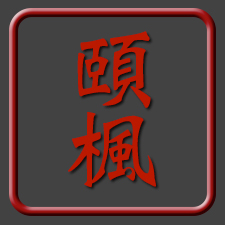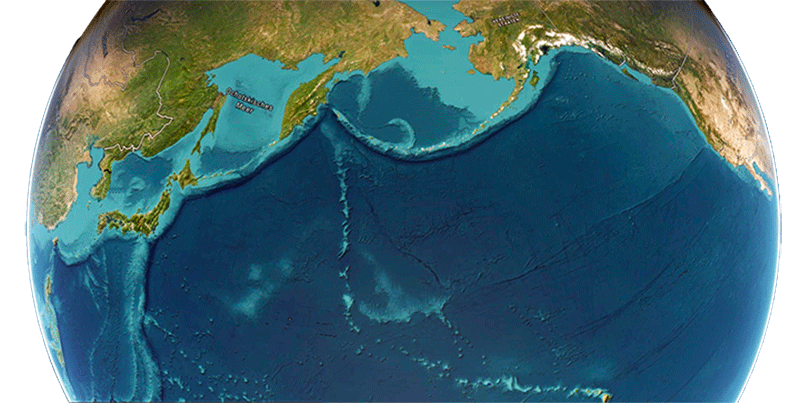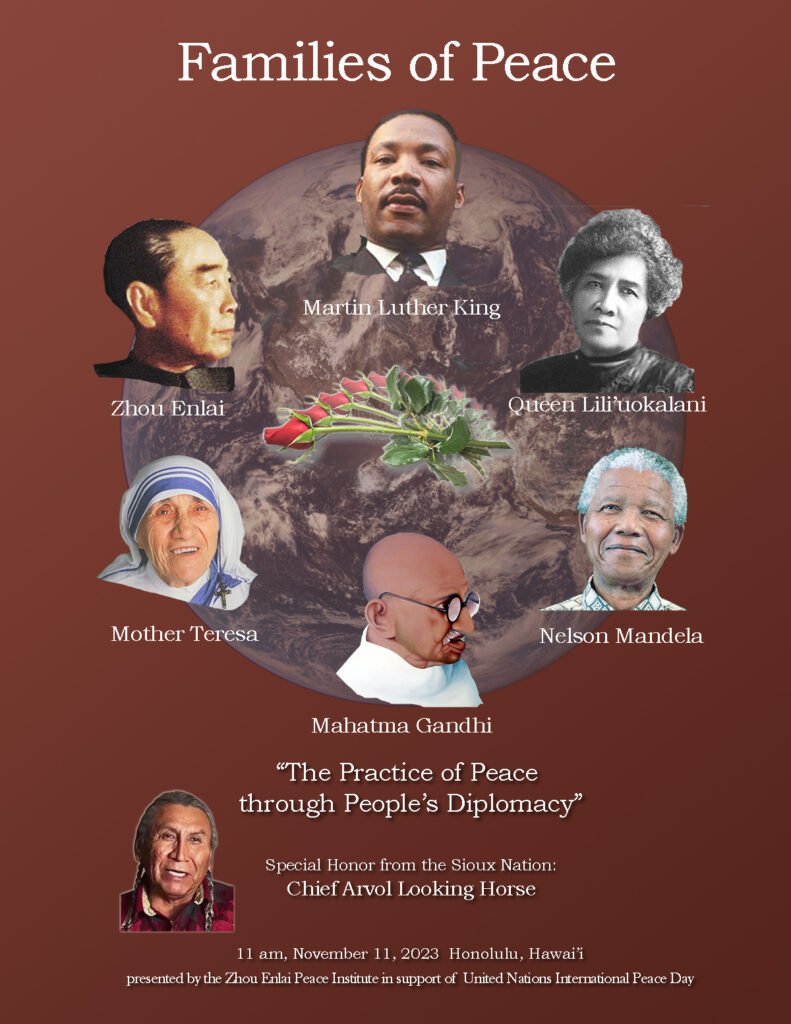This journal is dedicated to the cause of international understanding between China and America.
To the largest goal, which is peace between these two powerful nations, fostering a culture of equality,
mutual respect and reciprocal development.
本日记致力于促进中美两国在国际事务方面的相互理解。
同时还有更远大的目标,那就是促进两个超级大国之间的和平,
营造相互平等,互相尊重和互惠发展的文化氛围
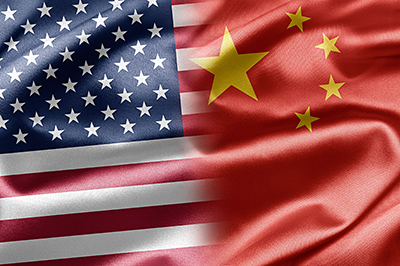
Reciprocal Journal
互惠 日记
Editor: Michael North
If you wish to contribute, or suggest a topic,
you may do so by sending an email to editor@asiapacificgroup.us.
编辑:麦克·诺斯
如您希望贡献或建议新话题,
可发送邮箱至 editor@asiapacificgroup.us
March 24, 024
We prepared a report on Artificial Intelligence (AI) Policy. It highlights the collaborative efforts between China and the United States, emphasizing the significance of AI policy and governance discussions.
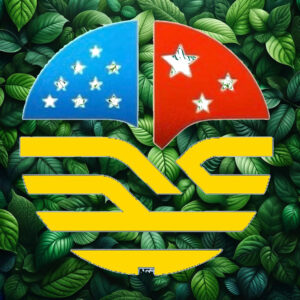 Initiated at the APEC meeting in San Francisco, this partnership has garnered attention from high-level policymakers in both countries, including involvement from the White House and various U.S. agencies in UN discussions and other international platforms.
Initiated at the APEC meeting in San Francisco, this partnership has garnered attention from high-level policymakers in both countries, including involvement from the White House and various U.S. agencies in UN discussions and other international platforms.
The Office of Science and Technology Policy (OSTP) plays a key role, with President Biden and Vice President Harris actively preparing for confidential discussions with Chinese counterparts at upcoming planned sessions.
Key personnel at OSTP include Director Arati Prabhakar, Chief of Staff Cristin Dorgelo, and other notable advisors focusing on daily AI issues.
We worked with Jerry Glenn on this report; he is a significant advisor in international affairs and AI policy, known for his work with the Millennium Project and contributions to the Zhou Enlai Peace Institute.
His insights emphasize the lack of focus on Artificial General Intelligence (AGI) in current discussions, which he believes could have profound implications due to its capability to exceed human intelligence and control its development cycle.
The report outlines perceived benefits of AGI, such as revolutionizing industries, addressing global challenges, and scientific breakthroughs. However, it also raises concerns over job displacement, inequality, algorithmic bias, loss of control, and existential risks. The economic and security implications necessitate a thoughtful approach to AGI development, emphasizing safety, governance, and ethical considerations.
Finally, the involvement of the U.S. OSTP in international AI discussions is detailed, highlighting its leadership in the National AI Initiative, participation in international forums like the GPAI, and contributions to the development of international standards and dialogues on AI and AGI governance.
Supporting links:
- Millennium Project on AI Governance: [https://www.millennium-project.org/transition-from-artificial-narrow-to-artificial-general-intelligence-governance/]
- Time article on Yi Zeng: [https://time.com/collection/time100-ai/6308795/yi-zeng/]
- Beneficial AGI Summit: [https://www.millennium-project.org/beneficial-agi-summit-unconference-feb-27-march-1-2024/]
- Elizabeth M. Allen Bio: [https://www.state.gov/biographies/elizabeth-m-allen/]
- Wikipedia on Elizabeth M. Allen: [https://en.wikipedia.org/wiki/Elizabeth_M._Allen]
- National Security Commission on Artificial Intelligence: [https://www.nscai.gov/]
December 1, 2023
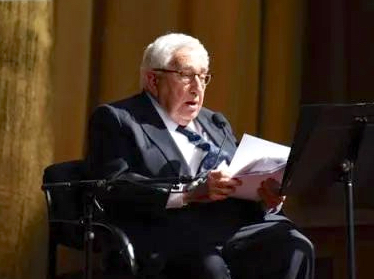
The passing of Henry Kissinger Alfred Kissinger (1923-2023), former U.S. Secretary of State, was reported worldwide a few days ago. An outpouring of news, ideas, analysis and opinion followed, about one of the most influential diplomats in the world. Everyone had an opinion about Henry Kissinger.
But no one had more vivid opinions than the leaders and the people of China, for whom Kissinger has been a familiar figure since his first meeting with Zhou Enlai in 1971.
In such cases, it’s useful to see what people are actually saying, rather than third-party portayals. What the Washington Post has to say about what it thinks Xi Jinping said on the passing of Henry Kissinger is less interesting and valuable than what Xi Jinping actually said.
Fortunately, some friends in Beijing assembled the actual words and reports from China — from the Ministry of Foreign Affairs, from the Premier, from the Chinese Ambassador to the U.S., and from the President of China.
Available here in English and Chinese,
without modification, comment or endorsement.
November 20, 2023
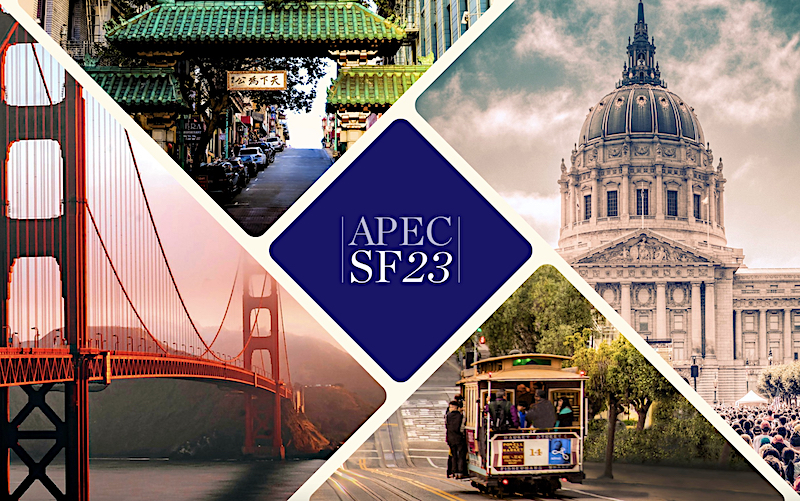
During the recent ministerial meetings of Asia-Pacific Economic Cooperation in San Francisco, president Xi Jinping released two important documents.
An update to China’s foreign policy principles
A personal presentation of important issues and answers
in China-US relations
Understanding what China actually says, as opposed to what others say that China says, is important. Both the above documents were reported upon, analyzed and quoted from — in small, selective bits — by the world press, including CNN, MSNBC, the New York Times, the Washington Post, the Wall Street Journal, and the Times of London.
The journalists did the best they could to summarize what was said, in a way that would be acceptable to their readers and viewers.
But the truly critical reader and researcher also needs access to the original, unadorned source material — even if it may contain ideas that go contrary to current assumptions. Without suspending disbelief, and with full skepticism about the inherent gap between words and action, we offer these documents in the hope they may lead to more useful understanding, vectored to peace between the two superpowers.
Herewith: links to the Chinese documents, with option to download to PDF:
The Five Pillars of Bi-Lateral Relations
Speech on China-US Foreign Policy

October 26, 2023
Report and Update
from the Zhou Enlai Peace Institute
China and the United States
People’s Diplomacy download (PDF)
Beginning in mid-August, through mid-October 2023, the founders of the Zhou Enlai Peace Institute attended a series of meetings in Beijing at the invitation of young business leaders, researchers and government officials.
For 12 years, the Peace Institute has sponsored many public, academic and media events, both in China and in the U.S., at sites ranging from the United Nations to the Nixon Library, from the Hawaii State Capitol to APEC, from the Ministry Foreign Affairs in Beijing to a National Memorial in Jiangsu Province, to Nankai University, to Shanghai Academy.
All events have had a common theme: friendship and cooperation between people in the United States and China. Background, with images, essays and video, are available for review at http://www.zhouenlaipeaceinstitute.org
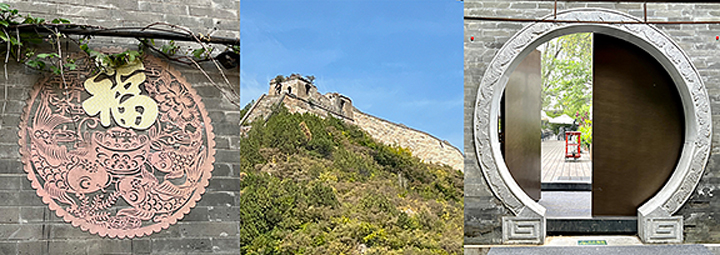
Because of this long proven shared experience, trusted friends in China are asking for advice today from the Zhou Enlai Peace Institute: “How can we establish a setting of mutual trust and respect, based on friendship and joint responsibility, between China and the U.S”?
The meetings in Beijing established several principles:
 People’s diplomacy is the most practical immediate way to set the two nations on a renewed path of confidence.
People’s diplomacy is the most practical immediate way to set the two nations on a renewed path of confidence.
 Actions that support formal diplomatic, trade, academic, technology and security relations but are independently directed were discussed.
Actions that support formal diplomatic, trade, academic, technology and security relations but are independently directed were discussed.
 With heart-to-heart connection among ordinary Chinese and American people, experienced as stories, presentations and arts that people of all ages and stages can share, confidence has a chance to flower.
With heart-to-heart connection among ordinary Chinese and American people, experienced as stories, presentations and arts that people of all ages and stages can share, confidence has a chance to flower.
 A resilient and durable alliance between the two great powers, working within established channels like APEC, the Olympics and the United Nations and supported by people’s diplomacy, opens the door to resolution of many global issues.
A resilient and durable alliance between the two great powers, working within established channels like APEC, the Olympics and the United Nations and supported by people’s diplomacy, opens the door to resolution of many global issues.
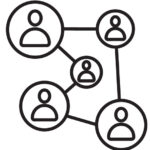 Priority is urgent, and has already begun, through private discussions, and through the luncheon on November 11, 2023, where invited peacemakers and leaders gather to tell stories, listen, feel and understand, and ask the guidance of Heaven on our work.
Priority is urgent, and has already begun, through private discussions, and through the luncheon on November 11, 2023, where invited peacemakers and leaders gather to tell stories, listen, feel and understand, and ask the guidance of Heaven on our work.
More Information: a Special Event in Honolulu,
Families of Peace; November 11, 2023
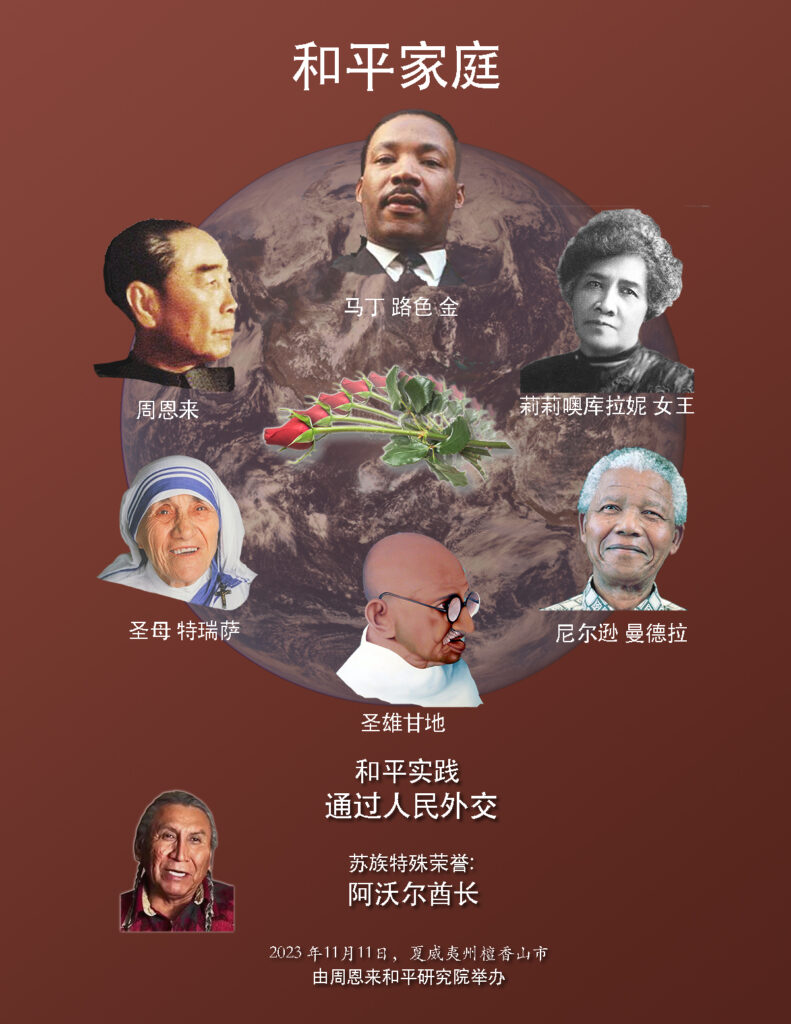
October 4, 2023
China through the Ages
A visit to a hotel and conference center gallery in Beijing, September 2023 reveals a vibrant combination of styles, media and epochs, from the ancient past to the present moment.
Music by Imee Ooi, a Malaysian Buddhist artist, from the first verse of the Diamond Sutra.
Artwork on display throughout the Yinbao Jianguo Hotel and Convention Center, in the green high tech area west of the city, Shijingshan Distritct.
Website: http://m.yinbao.jianguohotel-beijing.com/
Map: http://maps.app.goo.gl/rQLdVFmQHZzbmbP1A
September 15, 2023
Rabbi Prinz and Reverend Martin Luther King
Rabbi Yoachim Prinz spoke at the March on Washington in August 1963 — right after the passionate gospel music of Mahalia Jackson, and before the historic “I Have a Dream” speech by the Reverend Martin Luther King Jr.
He quipped, before starting — “I wish I could sing.” The crowd laughed.
Rabbi Prinz, of Temple B’Nai Abraham, Newark, was the chief rabbi of a synagogue in Berlin during the early years of Hitler’s terrorizing of the Jewish people; he witnessed and opposed the gathering shadows of fascism.
He moved to America, and started a lifelong mission to affirm human rights for all people.
This led him to a close association with Dr. King, and with the Black liberation movement.
This video was sent to us by a friend, Martin Greenwald, who commented: “Dr. Prinz was the rabbi at my temple in Newark, New Jersey. He Bar Mitzvohed me and my sisters…married my mother and officiated at her funeral. I went to Temple just to hear his sermons. He was a friend.“
September 10, 2023
Robert F. Kennedy Speaks about the Assassination
of Reverend Martin Luther King, Jr.
In China today, some are convinced that America is tearing itself apart with guns, racism, extremism. They are correct, and also incorrect.
I recall watching this speech live in 1968, as people were reeling from the news of Dr King’s death. RFK was speaking live to a Black audience in Indianapolis, and this is what he said, spontaneously.
So there is always more to America. And to China.
America once had a presidential candidate who could quote Aeschylus from memory. He says here:
“My favorite poet was Aeschylus. He wrote: ‘In our sleep, pain which cannot forget falls drop by drop upon the heart until, in our own despair, against our will, comes wisdom through the awful grace of God.'”
July 20, 2023
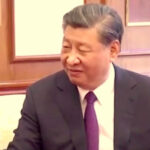 Interview in Beijing:
Interview in Beijing:
President Xi Jinping of China
and former US Secretary of State, Henry Kissinger
Recent American visitors to Beijing in June and July 2023 have included senior Administration officials — Secretary of State Anthony Blinken, Treasury Secretary Janet Yellen, and Special Presidential Envoy for Climate, former Senator and Presidential candidate John Kerry.
All have met with their counterparts, and some with President Xi Jinping. Each meeting has featured a gradual relaxing of tensions in specific fields, and declarations of joint larger objectives; it’s a welcome counterpoint to the tone of recent years.
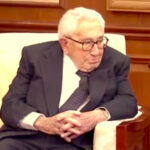 This trend seemed to continue and grow in personal terms today, with the hosting of former Secretary of State and National Security Advisor, Dr. Henry Kissinger, by President Xi Jinping.
This trend seemed to continue and grow in personal terms today, with the hosting of former Secretary of State and National Security Advisor, Dr. Henry Kissinger, by President Xi Jinping.
Across 52 years of history, back to when Zhou Enlai and Dr. Kissinger pioneered the resumption of diplomatic contact between China and the US — the President and the former Secretary reached out with warmth for something deeper than diplomacy, finance and environment — peace.
See video and transcript here.
June 20, 2023
A new Transpacific Alliance:
Open Trade among the US, China, Canada and Korea
Four growing businesses announced a trade contract today, focused on the magnesium industry to start, but with wider implications in the industrial economy, favoring balanced environment initiatives.
Meeting around a four-flag table in Pusan, Korea, representatives signed a pact to build good business together, to be a foundation for enduring peace.
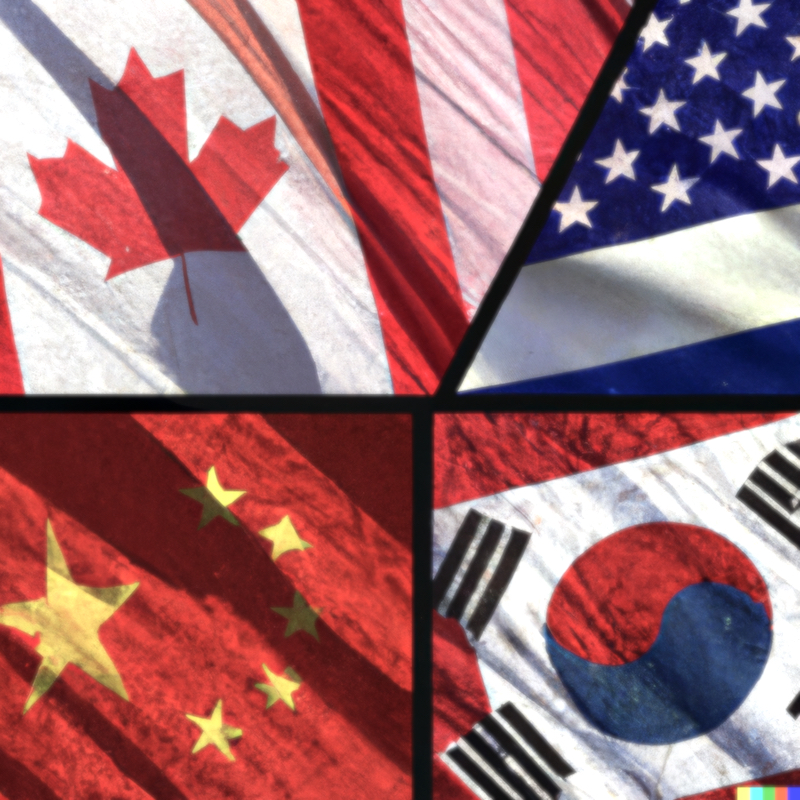
Read more details here
on the website of Galaxy Trade and Technology
April 21, 2023
The Xian Incident:
A Turning Point for Zhou Enlai and China
Abstract for a paper, presented to the Zhou Enlai School of Government,
Nankai University, Tianjin
“Before the Xi’an Incident, China was torn apart, by internal disunity and foreign occupation. Afterward, China was on the path that culminated at the rostrum above Tienamen, October 1, 1949. Before the Xi’an Incident, Zhou Enlai was a commander and intelligence director for the Red Army; afterward, he was maturing into a diplomat, both nationally and internationally, and the first Premier and Foreign Minister of the New China.
Two famous photos of Zhou were taken during this critical time; the first, before the Xi’an Incident, shows him traumatized, intense, bearded, with a stare of a thousand miles. The second photo, taken just a few months later after the Xi’an Incident, shows Zhou at peace, clean-shaven, with a look that penetrates from deep within. What happened in Xi’an, to cause this transformation?”
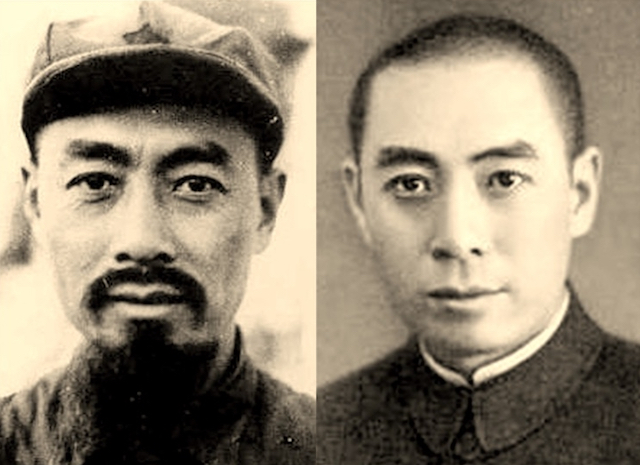
January 1, 2023
Chinese Students Forum, University of Maryland
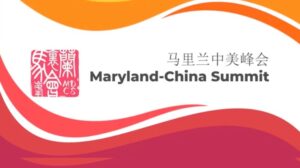


October 16, 2022
China Speaks
Every five years at the National Congress, China’s political and economic leaders gather to assess the course of the nation, and make commitments the next five years. It’s a time of intense meetings at every level, a time when policy docments, speeches, whitepapers — and videos — are published. It’s fair to say that millions of people work for a year or more on this outpouring of information.
So it makes sense, for people around the world who are trying to listen, learn and evaluate what official China is saying, to dip into this big river. Here are two videos and an article that we believe are of particular interest:
The Relationship between China and the United States
The Transition of China to Green Energy
The Growing Role of China’s Currency in the Global Economy
1. The Relationship between China and the United States
A discussion of bilateral diplomatic issues, held at the Great Hall of the People, Beijing. In Chinese, with English translation following.
2. The Transition of China to Green Energy
As one of the largest sources of carbon and greenhouse gas in the world, China recognized its role in reducing carbon emissions several years ago.
Massive investment in research, applied technology and business has made China one of the major centers of progress in this important field. An American journalist, working for CCTV, offers this high-level summary. In English, with Chinese subtitles.
3. The Growing Role of China’s Currency in the Global Economy
From China Daily comes this brief summary of another fast-moving change in China — an effort to make the RMB a global exchange currency alongside the US Dollar and the Euro.
Drawing on sources from the Bank of China, Sun Yat-Sen University, CITIC Securities and China Everbright Bank, this new effort, now just four years old and beginning to be implemented, could profoundly change the way trade, debt, prices and markets respond to a new liquidity from the world’s second-largest economy.
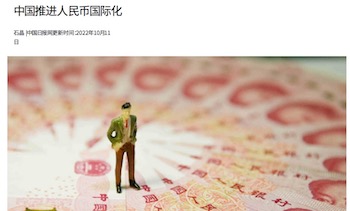 Chinese translation (pdf)
Chinese translation (pdf)
**
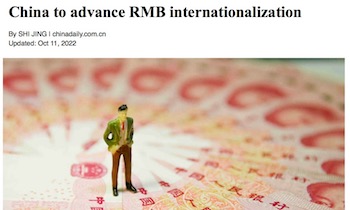 English (pdf)
English (pdf)
© copyright China Daily
September 27, 2022 – An Ode we Owe
Amanda Gorman,
speaking to the United Nations General Assembly
September 19, 2022; excerpt
*
*
“I only ask that you care
before it’s too late
That you live aware and awake
That you lead with love
in hours of hate.
I challenge you
to heed this call,
I dare you
to shape our fate.
Above all,
I dare you to do good
So that the world
might be great“
*
Download: Link to complete video, with full poem by Amanda Gorman
April 25, 2022 — The Key Question
From the center of the pandemic lockdown in Shanghai, comes this speech from Ma Mengjia. Engineer, entrepreneur, leader of TEDx Xujiiahui, she is serving the people in her apartment block by going out into the empty city to do their shopping, get what they need, bring it back, connect with the people.
She writes:
 At the end of 2015, I had the opportunity to attend the TED Global Conference in Geneva.
At the end of 2015, I had the opportunity to attend the TED Global Conference in Geneva.
During a break, I went to the bar and asked for a cup of coffee. At that moment, a middle-aged man, tall with a bushy beard, approached. We exchanged greetings and introduced ourselves; he told me that he was a life coach.
He came to a stop and looked me in the eye, asking,
“What is special about you?”
I was taken aback because it was the first time I’d been asked this question, and I kept silent for a while.”
April 9, 2022 —
Imagine
John Lennon’s son, Julian Lennon, has never before publicly performed his father’s master work, “Imagine.”
Until now: he offers this performance in support of the people of Ukraine, in the cause of peace. Information on how to offer support is at the original Youtube page for ths video, https://www.youtube.com/watch?v=NicWjYMPDG0
One comment there reads:
“He is his Father’s Son! Said he never wanted to sing this Song but now was the right time. He always wanted to do his own music and everyone can understand that knowing who his Father is. Huge shoes to fill. I am so glad he finally decided this was the right time in honor of Ukraine. Perfect song for the moment in time. And a gift to the World as we have all missed this Song and that voice. John would be so proud. I sat here and closed my eyes and for a moment I was back in time. It is a Prayer for the World and Peace. Thank you, Julian!”
March 5, 2022: Three Historic Anniversaries Coincide
During a period of two weeks, we mark the 50th Anniversary of the Shanghai Communiqué, the 124th birthday of Zhou Enlai, and the closing of the Beijing Winter Olympics.
All three are significant milestones in the development of China’s relationship with the world.
“Today, the people of the world yearn for leadership of the character shown by Zhou Enlai and Henry Kissinger. These pioneers took great risks in advocating for peace, and through an artful combination of pragmatism and vision, their goals were ultimately achieved.
Who will rise now, to carry their legacy forward?”
Read the full article, published on the website of the Zhou Enlai Peace Institute:
English: http://www.zhouenlaipeaceinstitute.org/building-peace/shanghai-communique/
Chinese: http://www.zhouenlaipeaceinstitute.org/zh-hans/buildingpeace/shanghai-communique/

February 18, 2022: Magnificent Moments at the Beijing Winter Olympics

July 11, 2021: The Seen and the Unseen
Today, the banner headline in the leading daily newspaper in China (People’s Daily, Beijing) reported on a story that was not only overlooked by Western media. Even if they heard of it, this would not be regarded as newsworthy at all.
But for 1.4 billion Chinese, here’s the news of the day:
“An event commemorating the 50th anniversary of Henry Kissinger’s secret trip to China took place at Beijing’s Diaoyutai State Guest House on Friday, the very place where the national security adviser to then United States president Richard Nixon spent many hours in conversations with then Premier Zhou Enlai.
That trip was followed by Nixon’s historic visit to China the following year and the signing of the Shanghai Communique, the first communique between China and the US.
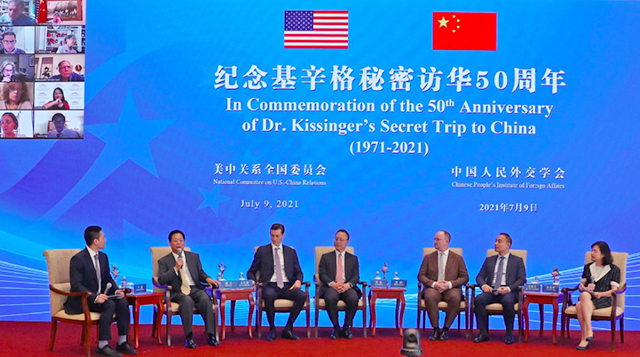
Addressing the event, Vice-President Wang Qishan said that despite ups and downs over the past five decades, Sino-US relations have kept moving forward, bringing enormous benefits to the two peoples and contributing to world peace, prosperity and stability.
China’s development is an opportunity for the world, and Beijing and Washington should be partners for common development, Wang said.”
Sometimes, it’s not what you see that reveals the real story; it’s what you don’t see. A very Chinese admonition.
Click here to download the full article.
April 22, 2021: US Legislation Bans Anti-Asian Hate Crimes
In recent weeks, people of Asian ancestry in America have experienced a frightening, humiliating and dangerous series of attacks by some Americans.
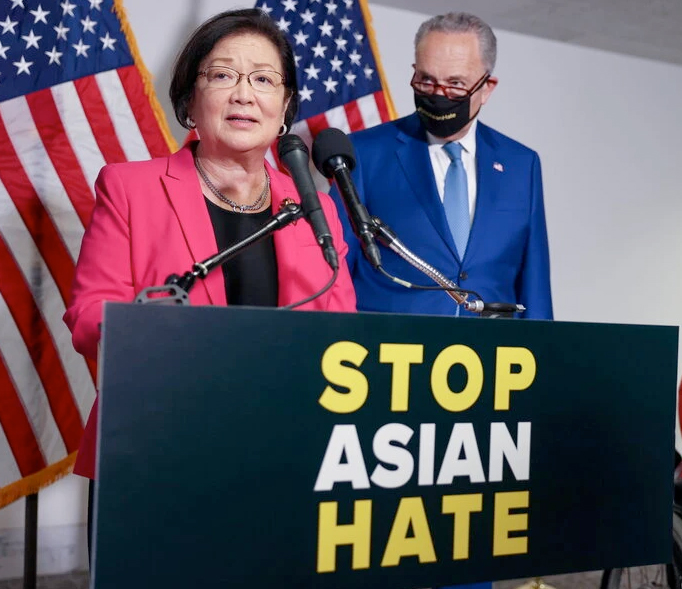
Senator Mazie Hirono of Hawaii and Senate Majority Leader Chuck Schumer of New York, at the passage of “Stop Asian Hate” legislation in Washington DC..
The stress of the global pandemic in America, experienced by every person, family and business, has combined with false information about the COVID-19 virus and historic fear of Asians as being “foreigners.” This volatile mix has led to many painful experiences, in which Asian Americans have been physically and emotionally attacked, and many feel vulnerable.
In times of crisis, sometimes we see the worst aspects in people; sometimes we see the best. The global pandemic has revealed many examples of both.
This situation has affected our family and friends personally. People of Asian and Pacific-Island origin are highly respected, valuable members of the American community, adding immeasurably to the depth and beauty of the American tapestry. America would not be the America we love, without Asian-Americans and Pacific-Islanders.
Fortunately, strong legislative action has been taken, and more is on the way. In a vote in the U.S. Senate, virtual unanimity, almost unprecedented in recent years, was achieved today, with a 94-1 vote in favor of a bill that establishes a new office at the Justice Department to protect Asian-Americans. The bill also encourages the creation of state-run hate crime hotlines, provides grant money to law enforcement agencies that train their officers to identify hate crimes and introduces a series of public education campaigns and arts programs around bias against people of Asian descent.
See the full text of Senate Bill 937, 117th Congress
Senator Mazie Hirono of Hawaii personally spoke with many of the 100 Senators, and assured that this bill would pass, with support of many other Asian-American legislators. Passage is expected shortly in the House of Representatives, after which the Act is expected to be signed into law by President Joseph Biden.
Here is a full report from the New York Times. (PDF)
Update. May 20, 2021:
Hate Crime Legislation Signed into Law
April 18, 2022: US-China Dialogue Founded on Climate Change
Former US Secretary of State, John Kerry, is in Shanghai for high-level talks with officials from China’s Ministry of Ecology and Environment. The above video is an interview from the Wall St. Journal. According to news reports:
“The U.S. and China, the world’s two biggest emitters of greenhouse gases, said they would work together to set more ambitious goals to tackle climate change, a rare statement of agreement at a time of heightened bilateral tensions.
“John Kerry, the Biden administration’s special envoy on climate change, said Sunday that his meetings with his counterparts in Shanghai were productive, adding that the two sides discussed the possibility of China “enhancing” the commitments that leader Xi Jinping made last September, to reach peak carbon emissions before 2030 and to achieve carbon neutrality—net-zero carbon-dioxide emissions—by 2060. “This is the first time China has joined in saying it’s a crisis,” Mr. Kerry told reporters…
more detail, with links: Kerry-Shanghai-Climate
March 31, 2021: Martin Luther King Speaks
The voice of Dr. Martin Luther King Jr. — from the end of his last sermon. These are the final words he spoke in public. Images from the King Center in Atlanta, Georgia: monuments, memorials, fountains, exhibits and the Ebenezer Baptist Church. The spirit of an American peacemaker provides insight into the spirit of the nation.
January 10, 2021: An Open Door
How Relations between China and America
may be Transformed with the new US Administration
The great American poet sang:
Your old road is rapidly agin’
Please get out of the new one
If you can’t lend your hand
For the times they are a-changin’
…Bob Dylan, 1964
These words come to life again now, as America enters a new stage in its long, winding evolution. The world watches, listens and awaits a new Administration.
No nation watches America more closely than China. As friends, competitors, allies, teachers and students of each other, Americans and Chinese are closely linked. The links go deeper than most of us know — for example, in 1784, the newly independent America dispatched its first consuls to Guangzhou, and some of the Founding Fathers admired China, including Benjamin Franklin, Thomas Paine, James Madison and Thomas Jefferson.
It’s possible to anticipate the type of changes that are coming for US-China relations, since many of the people and ideas that guide the new Biden Administration are well-known and understood, and they fall in line with historic trends and priorities that America has pursued in the modern era.
The complete article
written for the Pacific Economic Cooperation Council (China)
at the Foreign Ministry, published by
Beiwai (Northwestern) University, Beijing and
The Zhou Enlai Peace Institute
December 30, 2020: A song to New York, China, America
Henry Yao arrived from China as a teenager from Guanghzou and held myriad jobs around the city — ironing pants at a sewing factory, waiting tables, delivering belt buckles — before working at the Army & Navy Bags store on the Lower East Side, and taking it over as the owner.
The global pandemic seriously reduced his business, and he was close to closing down. For 13 years, he had been a beloved figure, another small business owner folded into the local framework. He liked the straight talk of New Yorkers and loved anything baseball.
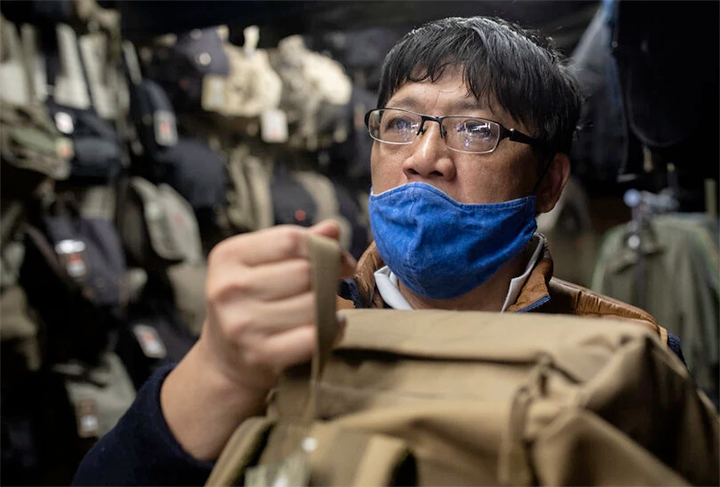
First-time visitors would be caught off-guard by Mr. Yao’s charm. He would offer up a compliment, which led to an exchange.
“It was like I had already known him; it was a weird familiar energy,” Gabriel Rivera, 27, recalled about encountering Mr. Yao a few years ago.
Then, on July 14, just when Mr. Yao figured he was in his last month of operation, came a shifting of the stars.
That’s when Mx. Thibodeaux launched a GoFundMe campaign for Mr. Yao, tossing in the first grand. Mr. Yao had never heard of crowdfunding. He was touched.
An hour passed. Suddenly a line began to form outside.
It had not been obvious to Mr. Yao’s patrons that he might be in need. In devastating times, when everyone is hurting, it can be hard to absorb the details. But now they were here, waiting in 90-degree heat for a man who had turned a casual purchase into a memory.
Mr. Yao scrambled about, sweaty and beaming and marveling at the affection. The fund-raiser soared to more than $25,000.
Read the full article (PDF download),
from The New York Times
November 20, 2020: Global Market Strategies for Magnesium
by Matt Lorin, Galaxy Trade and Technology
presented at the 7th International Conference on Magnesium

In my role as Vice President for Strategy at Galaxy, I bring together two areas of interest that are a metaphor for our company: the importance of global environmental security and the power of civil society.
As we all know, metals are not just at the core of China’s domestic and export markets, but also at the heart of the world economy. Metal prices are not only important to manufacturers and end-users but have long been used as a tool for monitoring global economic and market conditions. Metals, therefore, are a powerful representation of our global interdependencies, starting with China’s relationship with the world.
Since we believe magnesium is a greener metal, we want to know how to help bring magnesium to market? What will governments, banks and private enterprise have to do for magnesium to become a major metal?
The simple answer is — absolutely nothing. We do not have to do anything. It will happen on its own. The forces of nature are on our side.
What we are really asking is; what can be done to bring this greener, lighter metal to market faster, more efficiently and sustainability? The answer is that there are many things we can and should do. Some are about human behaviour and systems, others about human emotions and perceptions.
We need to fashion the ways we mine, fabricate and trade this green magnesium to model the human behaviour and system processes that will strengthen our relationships with each other and with our planet. In short, we want more trust- building, less fear and suspicion; greater stewardship and strategic thinking — less exploitation; and wider partnership and collaboration — less isolation.
As we all know, prices of metals, like prices for any commodity, are essentially determined by supply and demand. It is, theoretically, quite simple. However, to assume that information on supply and demand are available and accurate would be a mistake. In general, the less information available, the greater volatility. Volatility as a characteristic of markets is not good for good actors. In this time of uncertainty, the more stability we can bring to markets, the better.
More mature metal markets are characterized by more transparent price discovery, as well as option and forward contracts that reflect what stakeholders expect metal prices to be in the future. By storing and publishing data, markets can provide some degree of risk reduction for buyers and investors. Attracting stakeholders to magnesium and its potential, without asking anyone to take on more risk.
So, first things first: civil society and governments should focus on enhancing transparency and accountability. Transparency is an essential strategy to prevent fraud, waste and to build trust.
Transparency plays a critical role in ensuring the efficient allocation of resources by allowing a market to evaluate and impose discipline on policy. By providing stakeholders with access to information relating to financial transactions, transparency can effectively deter bad behavior and build confidence in the marketplace.
So, step one: we ask everyone to join us in committing to identifying practices and approaches for leveraging new technologies to promote information transparency.
Another aspect of building trust through transparency is confronting the fear of unsure “access” to the commodity itself. How do we reduce the perception (and current reality) that access to high quality magnesium is in question?
Since one of the greatest challenges of bringing magnesium to market today stem from a lack of confidence in supply. Indeed, supplier performance (in terms of risk, reliability and quality) and ensuring sufficient supplier capacity to meet demand rank as a top challenge.
Here, we believe that “trust” is a powerful tool against fear. Trust is not only information transparency; it is also about proximity. The closer we feel to and the closer we actually are to things, the more confidence we have that we can get to them. The perception is that if I can reach it, I can have it… What can be done to move our magnesium closer, literally and figuratively, to people who want it and need it?
First, we create physical “reserves” in places closer to our stakeholders. We need to move quantities of our asset from China’s mining centers to ports of commerce in the rest of Asia, Europe and North America. Tonnes of our asset need to sit in places like Rotterdam. Maybe even the Native American, sovereign deepwater port of Annette Island just miles off the coast of Alaska. When things go wrong, they are everyone’s insurance against supply chain and political risk.
Second, we improve our logistics and supply chain management such that people feel they have more reliable access, even if the asset lives over the horizon.
We need to learn lessons of the past and make corrections in light of more weather, terrestrial and pandemic uncertainty. Few stakeholders have a holistic view of their entire supply chain network. Such a view considers all supplier and customer flows simultaneously. Instead of perpetuating a piecemeal approach, we need to manage logistics holistically. This means:
Managers must determine which modalities (truck, rail, and boat), over which routes and junction points, optimize the flow of goods. They must assess trade-offs and implications for inbound and outbound logistics, including potential synergies with supplier and customer optimization.
Managers must consider the number of warehouses and distribution centers and where they are located.
Finally, perhaps most importantly, we should endeavor to return to our roots, when the world was driven more by people-to-people power than by government. As in the foundation of our company, we believe in citizen diplomacy: the concept that every individual has the ability to engage across cultures and create shared understanding through meaningful person-to-person, enterprise-to-enterprise interaction. The concept is not a terribly academic one; it’s not confined to universities or governments. It is how we make the world work better and more sustainably. We create greater and greater interdependencies while building trust and reducing risk.
If we are going to take advantage of this moment, then the challenge is not really economic, nor cultural, not even political. It is for people to get together and to leap ahead of governments — to work out, not one method but thousands of methods by which we can gradually learn how to work better together.
In the context of the global magnesium trade, this means we will all need to increasingly focus on building partnerships with customers, suppliers and even competitors in order to achieve innovation, improve supply chain efficiency and maximize growth and profitability.
At the end of the day, having an asset is both an opportunity and a responsibility. Whatever is done, no single actor can go it alone. Government to government, enterprise to enterprise, people to people. These concepts are deeply rooted in Chinese tradition. We need leadership measured in longer terms.
In the face of complexity, we need clarity.
In the face of instability, we need continuity.
In the face of isolation, we need cooperation.
The human touch.
This is what Galaxy stands for.
October 3, 2020: A Daughter of the Flying Tigers
At the Indianapolis Motor Speedway, the final event in the American GT4 SRO Racing Tour took place in early October. The vast stadium rippled with the roar of the most powerful engines in the world, but missed a key ingredient — 300,000 fans who normally fill the seats. Only 40,000 were authorized to attend, because of the pandemic.
Nonetheless, the race was run with full vigor and competitiveness; champions won and were crowned. Sponsoring the awards ceremony was Galaxy Magnesium, which is bringing lightweight, environmentally-positive magnesium to the world of competitive motorsports.
The magnesium is coming largely from China, and the vehicles using it are designed by Panoz Engineering.
Stéphane Ratel, head of the worldwide SRO organization that stands astride a multi-billion dollar industry, attended the seminar given by Galaxy, which featured a video appearance by Nancy West, daughter of one of the original volunteer Flying Tigers. These heroes of America and China are respected in both countries for the contribution they made to protecting freedom for future generations — risking their lives, flying and building together.
Nancy West, who lives in Kokomo not far from Indianapolis, shares memories of her father, a giant of history, and her reflections reflections of where China and America have come together.
September 23, 2020: New York City Pandemic Stories
The nobility, toughness and beauty of New York, the world’s first truly global city, is embodied in this masterful short prose by Corina Knoll, from the New York Times.
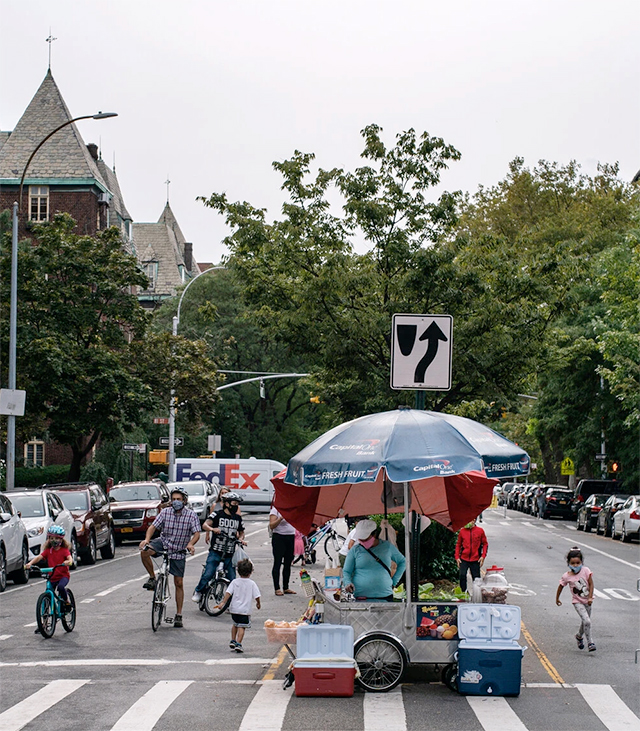
Short excerpts here:
“It is not a tale of triumph. Fear persists about what lies ahead. But small transformations have unfolded that reveal the grit and gifts of the city’s people…
“During a crisis that has not disappeared, there are signs of resilience and innovation — vibrancy in unusual places and a reimagining of community, resources and opportunity. And a distinct sense of resolve: Our landscape was profoundly altered. But we remain. We will endure…
There is no presumption that any sorrow or despair will be erased. Industries, pastimes, institutions, systems, livelihoods and families have been broken. The trauma of the last six months will play out for lifetimes. And fear about what lies ahead persists.
“There are still these beautiful moments that you don’t have in any other place in the world, like walking in Prospect Park and stumbling upon a jazz concert or a brass band,” said Dominique Nisperos… “The lows of the pandemic have been really low, but what’s been my saving grace has been the people of New York.”
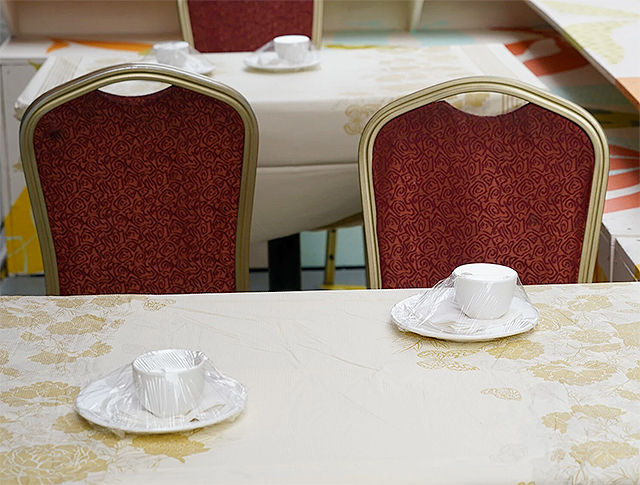
Full text here. https://www.nytimes.com/2020/09/23/nyregion/new-york-city-coronavirus-six-months.html
Thanks to The Times for keeping good writing alive.
August 30, 2020: Sounds of Aotearoa
A virtual choir from Aotearoa (New Zealand) illumines the day with their passion and beauty. This artistry, sometimes uniting people from around the world, will be one of the lasting positive legacies of the global pandemic.
August 19, 2020: Democratic Convention
The Democratic Convention this week shows much of what is great and good about America; it’s important for Americans, and the world, to remind ourselves. Even in crisis, the strong spirit of the people rises.
One short video tells that story — young singers, from all 50 States and 7 Territories, all nations in the world — singing together. These are the faces, voices and feelings of America that China loves and respects.
August 1, 2020: Context
This is a time of great challenge for relations between China and the United States.
Words and actions reverberate back and forth in official channels, as the long, productive relationship between the two nations, growing consistently since 1979, apparently begins to fray in 2020. This situation brings to mind another time — 80 years ago — when another generation was faced with challenges to peace. When the people and leaders of China and America responded with patriotism, with heroism, by helping each other, in a profound feeling of peace and mutual respect.
Most of us were not alive then to see it, but the memory is still fresh and meaningful today — perhaps it provides historic context that may offer guidance to us today.
Here is to the story of the Flying Tigers — a group of Chinese and American heroes who fought together, both before and during World War II, to help save the new nation of China.
Many young men met in the 1930’s and 1940’s, and American volunteers flew hundreds of combat missions to protect China. Those young men stayed in touch for decades — with the friendship of their families, and now their sons and daughters, mirroring the fundamental alliance between China and America.
Original title: “Flying Tigers Made Lifelong Friends.” Writer and Executive Producer, Chen Defu. Original music: Zeng Sujin. Produced by the U.S.-China Cultural Exchange Society. Translated and narrated by Michael North, for the Zhou Enlai Peace Institute; recorded at National Public Radio studios, Honolulu.
Full-length feature documentary available on request.

July 20, 2020:
Speech to the March on Washington. August 28, 1963.
We mark the loss of one of the great heroes of our generation, John Lewis.
We went back to the original archive, faded, murky and tinted in picture and dull in mono sound, to restore the energy of that day so long ago, at the Washington Monument. The last of the living original speakers from that historic day. This video is unedited, uncut, with greatest respect for the youth he was, and for the tireless warrior he would become until his passing at age 80, July 2020.
The fierce focus of young John Lewis lives, a source of pride for all people in America, and for peacemakers around the world.
July 1, 2020: Zhou Enlai Teaches Nixon the Five Principles of Peace
Zhou Enlai speaks at the Great Hall of the People in Beijing, explaining the Five Principles of Peace to U.S. President Richard Nixon and the American delegation.
Shortly after signing the Shanghai Communique, which began the proess of diplomatic, cultural and business renewal between China and America. March 1, 1972.
The Chinese Premier said, “There exist great differences between the governments of these two countries, but these differences should not hinder the development of normal state relationships between China and the United States, under the five principles of mutual respect for each other’s territorial integrity and sovereignty, mutual non-aggression, mutual non-interference in each other’s internal affairs, equality and peaceful coexistence.”
The Chinese miitary band played “America the Beautiful.” Nixon said, “This was the week that changed the world.”
June 12, 2020: What it Takes
May 25, 2020: Two Videos, from the Heart of New York
These two videos were produced in New York City by volunteers, encourgaing New Yorkers to wear masks to help in the struggle with corona virua. This originated in a public call from the Mayor’s Office for Public Service Announcements.
May 22, 2020: Learning from the Virus
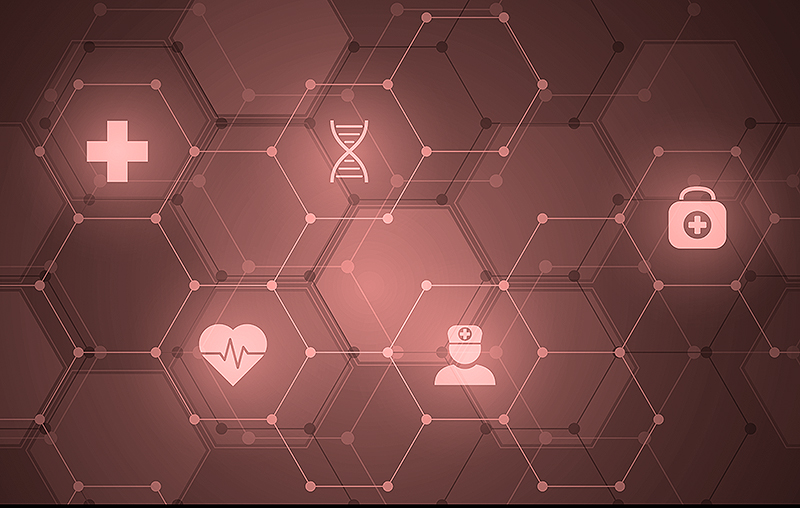
B. China’s unemployment rate on January 1: 2.2% — today: 5.6%, and trending down — the worst in a generation, and difficult to manage
May 18, 2020: International Perspectives on the Pandemic – Italy and China
Friend and ally Ma Mengjia (director of TEDx in Shanghai) contributes this thoughtful piece, from SDA Bocconi School of Management in Milan:
“The Covid-19 pandemic is destroying many human lives, and the social and economic consequences of the lockdown and social distancing policies are wreaking havoc on many more. The livelihood of countless families and entire communities the world over jeopardized by the potential aftermath of the virus, with unemployment on the rise, and uncertainty on whether companies can stay afloat because of delayed investments, cancelled contracts, and disruptions in national and international supply chains.
All across the globe, all eyes are on the evolving situation in China, as we wait to see what tools will be effective in facing the second phase of the emergency. Likewise, we also look to the countries that were first struck by the Covid-19 pandemic, in an attempt to predict what will happen here in Italy to our companies and our organizations in the coming months.
In South Korea, after many companies encouraged their employees to work from home during the height of the crisis, the flows of public transportation and the level of air pollution are slowly climbing back to pre-crisis levels. Most pedestrians wear masks, which are now available in pharmacies and stores. Cafes and restaurants are open again, although with fewer customers.
China too is slowly entering its own post-Covid-19 world, and the experience there is shining a light on five critical questions we need to focus on: uncertainty of demand, lack of liquidity, interruption of supply chains, digitalization, and last but not least the very real (not simply professed) importance of the human side of companies, more critical than ever before.
As for the first question, China’s example shows that measures to contain the pandemic also encompass restaurants and other communal areas, in addition to limitations on air travel. What’s more, domestic demand will be limited due to unemployment, financial difficulties, and risk-averse behavior among consumers in general. Right now many people are still frightened by what has happened, and it will take time before the situation goes back to normal. On the other hand, with companies resorting to smartworking, there is greater need for digital communications and solutions for storing sensitive data, meaning that demand for connectivity and cloud storage solutions is constantly climbing. Putting millions of Chinese residents on lockdown has also triggered an upsurge in demand in the gaming sector for mobile phones; with people spending hours at home, more users are spending more time gaming online.
As for dealing with liquidity, interesting data have come to light in a survey run in February 2020 by several Chinese universities. The Enterprise Survey for Innovation and Entrepreneurship in China (ESIEC) analyzed the impact of the pandemic on over 2500 Chinese small and medium sized enterprises (SMEs). The main challenge for most of these companies is a lack of liquidity. In fact, 20% of interviewees said they couldn’t survive for more than a month. The survey also confirmed weak domestic demand, with ripple effects on company revenues. The drop in profits hit exporters hardest, with more limited damage to SMEs that operate in B2B sectors.
The ESIEC study also reveals that companies positioned in the middle of the supply chain of a given sector need to contend with a lack of raw materials and components. The global economy depends largely on Chinese manufacturing of finished products and components for the automobile and electronics industries, for medical equipment and supplies, and for consumer goods in general. According to projections, it looks like the return to normal for production will be slow. What’s more, a labor shortage in February and March 2020, along with stricter safety standards in the workplace (including PPE for employees), and the sluggish recovery in the logistics sector may cause severe disruptions of the global supply chain.
Moving on to the question of digitalization and innovative solutions, we find that China is currently experiencing an added acceleration in digital transformation. In 2003, after the SARS epidemic ended, the Alibaba Group created Taobao, an online sales platform. In recent weeks this and other platforms are offering an immediate remedy to the lack of liquidity: with the help of blockchain technology developed by Ant Duo-Chain, SMEs can apply for loans by tapping into the credit of bigger players. At the same time, e-commerce is also growing thanks to an upswing in online purchases, often integrated with popular chat platforms.
In the corporate context, upheavals trigger innovation. The need to limit social contacts during the epidemic fact-tracked the introduction of delivery systems via self-driving vehicles. What’s more, social distancing policies for citizens and pressures on doctors and nurses spotlighted the need to expand telemedicine, focusing greater attention on mental health at the same time. Unmind and Headspace, UK-based startups for psychological support, have begun offering free access to their platforms for healthcare workers. In China, the startup Guahao created a platform with more than 8,000 volunteer doctors who offer online consulting, even in English.
Will these changes become permanent? According to a consumer survey conducted in Hong Kong at the end of last March, before the second wave of the pandemic, only 6% of interviewees said they hadn’t changed their daily habits.
Like most of my colleagues, recently I’ve been receiving messages of encouragement and support from former students and other teachers all over the world. I also had the chance to discuss the impact of Covid-19 with Mengjia Ma, an entrepreneur from Shanghai and former participant in one of our Executive Training Programs at SDA Bocconi School of Management. She pointed out another incredible revolution that is underway right now on the front of digitalization of the consumer goods and services sectors – from “online hospitals” to livestreams for retail sales.
She also mentioned another sign of the changes that are taking place in post-Covid-19 society. On April 7, a television newsreader named Zhu Guangquan took part in a livestream show on Taobao Live, along with the influencer Li Jiaqi, to promote products from Hubei Province. The event generated over 3 million dollars in sales. A mainstream television presenter joined a famous influencer of beauty products to help local companies sell Wuhan’s famous hot and dry spaghetti, tea, snacks and other products from the region. And this isn’t the only example of celebrities or leading companies dedicating time, energy and resources to help their communities contend with the economic fallout from the pandemic. Pinduoduo, an e-commerce platform, has created a channel called “Help the Farmer” to reopen sales channels between farmers and customers which were interrupted by the crisis. JD.com and Alibaba, top e-commerce groups, have announced huge recruitment campaigns, hiring people who were fired from their jobs in restaurants, hotels, cinemas, and traditional stores. In Italy too companies reacted quickly with generous donations to hospitals, reconverting their production to personal protection equipment and valves for ventilators.
These events are signs of the shifting economic and social paradigms in the new world order, post Covid-19. In light of the long-term impact of the pandemic on the economic and social aspects of our lives, these changes are here to stay. So it seems that in the post-Covid world, success and progress will be measured not only in economic terms, but in human terms as well.”
Source: https://www.sdabocconi.it/en/sda-bocconi-insight/the-time-is-now-to-think-about-the-future
May 5, 2020: How it’s Done in China — Zero New Virus Cases in Nanjing
< a short film, in Japanese and Chinese, with English subtitles>
To control the spread of corona, a variety of coordinated measures need to be taken — so that the economy can function, and so the people’s health is protected.
These measures can be simple, common-sense, and inexpensive — but they do require a change in thinking. In this short film, two examples — put tissues in an elevator, so that people can touch the floor buttons with them. When delivering a package, put it into an elevator by itself, choose the floor, and send it up without getting in the elevator.
A good friend, Cyndy Ning at University of Hawaii, showed us this video and says:
“A City with Zero Cases of COVID-19.” Made by Japanese filmmaker Takeuchi Ryo, who lives in Nanjing.
He has documented many of the public safety measures the city has put in place, and which has led to zero increase of new infected cases, while COVID-19 is spreading like wild-fire all around the rest of the world.
As Takeuchi concludes, he was amazed how organized and effective those social distancing measures are, and he encourages many countries to learn lessons from Nanjing. Germany is already cooperating with China closely on implementing some of those measures.”
–note: original content produced by Hezhimeng — this video is copyright, for access please contact homeroomchina@gmail.com
April 22, 2020 A Postcard from China
A tribute to the doctors, nurses, medical workers and researchers around the world,
who are fighting the corona virus together.
April 16, 2020 The Ambassador from China: Interview on PBS
China’s Ambassador to the US said yesterday, in an informal interview on PBS. WNET New York:
“Let’s work together to respond to this global crisis, to save people’s lives, to save the future of global economy, and to save the future of the global community. This is our paramount task,” said Chinese Ambassador to the United States.
“If we aim at a new system of international governance that is open, inclusive, based on mutual respect among all countries, on the full recognition of the diversity of culture, civilization, political system, economic system — if we can do this, then I think all the things are ready for us to build a new and effective international governance system. We have to make the right choice now,” he noted.
“If we can still call this a wakeup call (I think we should have woken up long time ago), but still, if we have not started yet, we have to start real efforts to build a good international governance system for the 21st century, for the future,” he said, adding that big countries including the U.S. and China have great responsibilities in spearheading the efforts.
Full interview, including additional material, is on the GZero broadcast, here:
https://www.pbs.org/video/an-interview-with-chinas-ambassador-to-the-united-states-c0wdow/
Interview by Ian Bremmer
All video and transcript ©copyright 2020, GZero Media
http://www.gzeromedia.com
April 12, 2020 A Moment of Respite from Corona
With virtually the whole developed world shut down (except China), this Easter-Passover weekend was sad, eerie and beautiful.
The great Italian tenor Andrea Bocelli captures the moment in a solo performance from the Duomo in Milan. Normally crowded with thousands of people on this Sunday, the Duomo was filled with silence, and the spirits of generations past.
April 4, 2020 Shanghai, After the Virus
“I know that it is a tough moment in the world. I know it is not easy to stay at home. You have lost your freedom and moments together with your family. We have all experienced that.
“But trust me — keep doing it. If we are together, I am sure we can win this battle with the virus. After the virus is gone, our lives will be better again, like this.”
Our friend Mengjia from Shanghai takes us on a spring tour of the great city, to see the parks, and the people waking up in springtime after a long, dark winter.
Yesterday (April 4), Ching Ming was an important holiday in traditional Chinese culture, when people go to where their ancestors are remembered. Many Chinese families go back 2000 years or more, dozens of generations.
This year, Ching Ming was also a solemn national remembrance of the many who died in the first three months of this year, from the corona virus — and the many who sacrificed their health to save others.
China is just beginning to emerge from the shadow of the virus, and the process of mourning and remembrance has begun. It is also a celebration of life and renewal, as seen in this video, edited and reported by a respected 30-year-old young Chinese leader.
She offers comfort and encouragement to those of us in America, Europe and around the world, who are now walking the dark road that China has walked. As China has emerged, so will we —
April 2, 2020: We Were the World
What do Stevie Wonder, Michael Jackson, Paul Simon, Tina Turner, Bette Midler, Diana Ross, Bruce Springsteen, Ray Charles and Bob Dylan all have in common? They all appeared in the same music video. Remember?
Many of us were around in 1985, when this simple video electrified the world. If you were not, this is worth a musical moment…An expression of America’s innate optimism, outreach, generosity that sadly feels so antique 35 years later. It’s an all-time favorite in China, and the karaoke version is sung in clubs all around the country, every night.
This is the idealism that the Chinese most admire in America.
Ever wondered what happened, with the USA for Africa group that produced this video? Turns out, quite a lot.
The lyrics have a haunting resonance in this corona age —
When we heed a certain call
When the world must come together as one
There are people dying
Oh, and it’s time to lend a hand to life
The greatest gift of all
We are the children
We are the ones who make a brighter day, so let’s start giving
There’s a choice we’re making
We’re saving our own lives
It’s true we’ll make a better day, just you and me
March 31, 2020: Words from a Scientist
Simple, serious thoughts from Mr. Gates in The Post today—
His suggestions will not be followed, of course. Listening to a scientist and making policy decisions based on science would set a dangerous precedent for the current administration.
But it will be good to have on file a prescription that, six months from now, people will realize could have saved many lives. These recommendations echo directly the success in China; Mr. Gates follows China matters closely, observing and learning.
Gates is one of the few to point out that we’re only as strong as our weakest link — it does little good to close restaurants in Brooklyn if they’re still open and enjoying happy hour in Birmingham. One person from Alabama flying to La Guardia can infect fifty new people in a couple of hours, who get off the plane and…
March 17, 2020: Cherry Blossoms from China
It’s possible to get swept up in the tide of bad news, and it’s also important to pay close attention each day, to look ahead, continue to do our important work, to stay balanced as the corona crisis develops:
China is several weeks ahead of the U.S. and Europe in the progress of the virus. So far, China has suffered the most illnesses, the most fatalities, and the greatest economic disruption.
They’ve also practiced the most thorough and effective public treatment. So they’re ahead, but that’s good — it’s showing results.
I follow a Weixin group that tracks the Chinese auto industry — here are a few observations in the past 24 hrs —
Tesla to expand parts output in Shanghai, document shows. The automaker plans to add lines to make more battery packs, electric motors and motor controllers, according to a document submitted by the company to the local government. Tesla is working to localize its supply chain in the country.
Beijing Hyundai, Hyundai Motor Co.’s joint venture with BAIC Motor Co., said output has resumed at three production sites and suppliers despite the lingering coronavirus outbreak in China. The joint venture’s assembly plants in Beijing, the north China city of Cangzhou and the southwest China municipality of Chongqing have successively reopened, the company announced Saturday.
None of the 10,000-plus employees at the plants have been infected by the virus, allowing full production to resume at the three sites, it said.
And in the silver-lining category from China Daily today:
Statistics from consultancy Analysys Qianfan showed the monthly active users of Xiachufang reached 13.74 million in December. The number rose to 14.79 million as of January, and 26.8 million in February.
Moreover, Ecook, a mobile app that gives food lovers access to online recipes from the best cookbooks, has seen a surge in demand.
…more innovative operation methods in terms of technology, content, products and services should be adopted to retain these new users. “It is noteworthy that the epidemic has attracted new groups of consumers, such as elderly people, who originally didn’t belong to target user groups.”The outbreak has also made shoppers refrain from frequenting crowded brick-and-mortar stores, switching instead to online shopping, especially using e-commerce platforms that deliver daily necessities and fresh produce.”
JD Daojia, the local on-demand retail platform of Dada Group, said overall sales revenue increased 374 percent year-on-year during the Lunar New Year holiday in late January and early February, with the consumption of meat jumping 710 percent year-on-year, vegetables increasing 440 percent, and fruit 380 percent.
From the Belt and Road Journalists Network, Beijing:
“Since the outbreak of the novel coronavirus pneumonia (COVID-19), countries around the world have looked out for each other and joined hands in the battle against the epidemic. This battle makes us feel more than ever that human society is a community with a shared future that is interconnected and shares weal and woe. In the face of global challenges, all countries must work together to overcome difficulties.
“In the community with a shared future for mankind, we are waves of the same sea, leaves of the same tree, and flowers of the same garden. We believe that through our joint efforts, we will ultimately defeat the epidemic worldwide. Like the rainbow after a storm, the world will be a better place to live in after the epidemic.
And from a China military group on Weixin today:
“The subunit vaccine against COVID-19 created by experts from the Academy of Military Medical Sciences was approved for clinical trials on Monday night, China Central Television reported on Tuesday.
The team was led by senior bioengineer Major General Chen Wei. Since arriving in Wuhan, Central China’s Hubei province, in late January, Chen and her team immediately began working on a subunit vaccine.
The vaccine has been approved for safety, efficacy and quality by a third party. Chen said the vaccine also has completed preliminary preparation work for mass production.”
Finally, cherry blossoms are in bloom across China — this short video from a friend in a news bureau —
March 10, 2020: From Milan
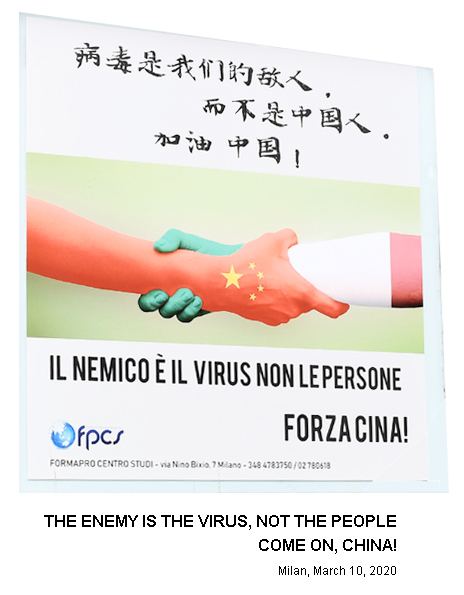
March 8, 2020: Long Island, New York City
February 22,2020: Xi Jinping and Bill Gates
2-22-2020
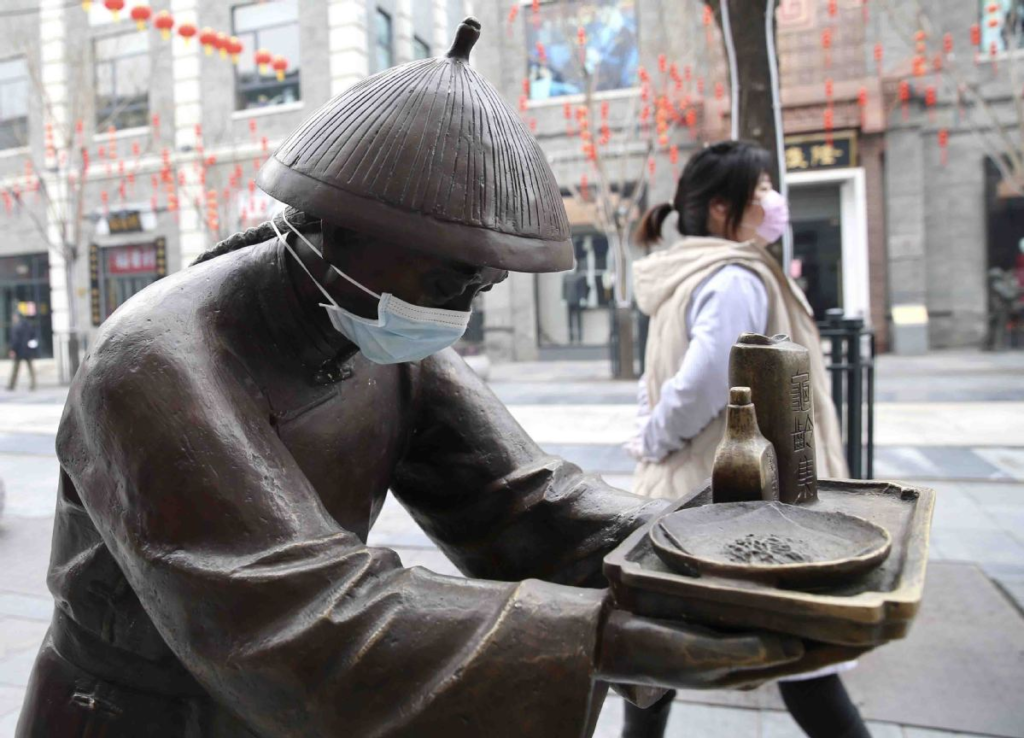
This exchange between Xi jinping and Bill Gates will get no coverage in the mainstream press in the West, because it’s too rational and positive —
“In his letter dated Feb 20, the Chinese president wrote: “I deeply appreciate the act of generosity of the Bill & Melinda Gates Foundation and your letter of solidarity to the Chinese people at such an important moment.”Gates said in his letter on Feb 6 that his foundation has committed up to $100 million in emergency funding, much of which will help China bolster epidemiological research, emergency intervention, and the research and development of drugs, vaccines, and diagnostics.
February 10, 2020: Message of Hope from Shanghai
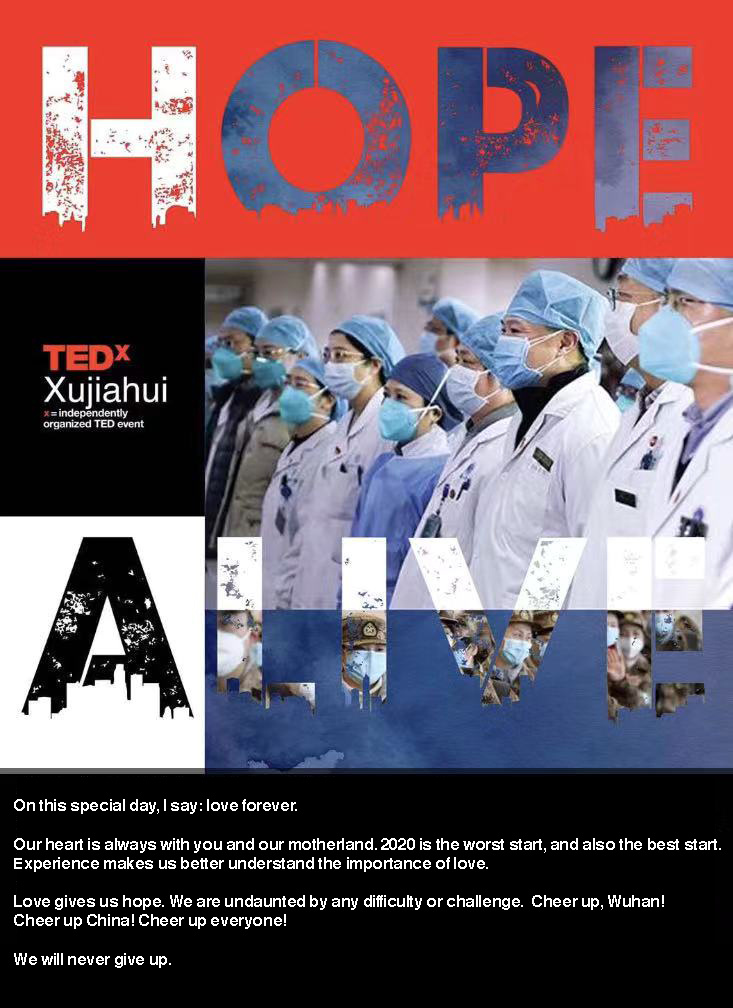
From our friends at TEDx in Shanghai, led by Ma Mengjia.
February 11, 2020: Robots Fighting the Corona Virus

One of the many reasons why China will handle the virus crisis, implement valuable new technologies, and find opportunity in the face of disaster —
“Since China sounded the alarm to combat the novel coronavirus nationwide, robot maker Shanghai TMiRob Technology has delivered 42 intelligent disinfection robots to more than half a dozen hospitals in Wuhan, Hubei province, where most cases of the deadly virus have been reported.
In fact, the company’s inventory has been exhausted, said Pan Jing, the CEO and founder of TmiRob. ‘Even the robot model demonstrated in the exhibition hall of our company has been purchased and delivered,’ he said.”
Here is the full feature article, from China Daily Global
February 7, 2020: The Coming Recovery
This is the first story of its kind I have seen from China: Planning for the post-virus recovery. There will be many more.
https://enapp.chinadaily.com.cn/a/202002/08/AP5e3ddc39a3103a24b11064a6.html
There are cues here to how the economic recovery will be stimulated, and by whom.
I strongly recommend that people outside China bookmark China Daily for regular reference — my day begins with a dose of the New York Times, the Washington Post, the London Times and China Daily.
Each day, it’s interesting to see which stories are highlighted in the different publications, and the varied interpretations.
Allowing for the fact that China Daily is a government-backed publication: the prose is dry, dense and fact-oriented. It efficiently reflects the party line, but it also includes information reporting that is better sometimes than its American and British colleagues. Even on straight news pieces, The Times and The Post tend to be tilted with opinions that express the editorial orientation of their chief editors.
Not better or worse, just different. The differences can produce real understanding.
January 25, 2020: Open Letter
To the Chinese People from the American People:
To all our dear friends across China — happy new year, happy new decade. For 12 years beginning now, we start to cycle through all star changes.
We in America send our love and support to you in China, our great partners and allies, as the flu illness is felt most immediately in China. Especiaily to our friends in Wuhan, Huanggang and across Hubei Province, we say — patience, strength. You will surmount this crisis, as China has met so many challenges in its past, always emerging stronger.
Please do not be afraid; you are not alone. We will do anything and everything we can to help and support you. Our scientists and doctors, and those from every nation in the world, now work for the Chinese people. This is our duty, our interest, our sacred obligation.
Because ee are all deeply connected; blood to blood, arm in arm, face to face, breathing together. Your health and survival are the health and survival of the world.
Let us support those affected, with high compassion — caring for the young, the elderly, the sick and weary who are most vulnerable. Living each day with the greatest care, learning the best information from each other, from our doctors and leaders, following the best health practices with discipline, we can create an inspired example for the world.
At the moment, China has taken leadership in the fight against this sad illness. We are counting on you to rise as heroes, as your fathers, mothers, grandmothers and grandfathers did to create China 70 years ago. We give you our heart, aid, support, whatever you ask that we can do — we will do.
When all is healthy again, and this time has become a memory, let us ensure that it is a proud memory, that we learn and grow with gratitude from this experience.
The Zhou Enlai Peace Institute; Honolulu and Beijing
January 10, 2020 A Thousand Ways to Get it Right
Published on Xinhua News website, an interview with yours truly…
In a recent interview with Xinhua, Michael North, chairman of Galaxy Trade and Technology, a U.S.-China joint venture engaging in international magnesium trade, pointed to the strong and deep fundamentals of U.S.-China relations.
The interweaving of these two economies, these two societies and these two cultures is “so deep, so continuous, so profound and so meaningful to so many people” that it cannot be “seriously disrupted” by the U.S.-China trade disputes, North said.”
More here…
http://www.galaxytradetechnology.com/news/1000-ways-for-us-china/
November 15, 2019 Impeachment? What Impeachment?
Today, on a full day of dramatic testimony by the former US Ambassador to Ukraine to the House of Representatives, the covers of every major newspaper in America were packed with stories about the impeachment hearings in Washington DC.
But not in China Daily. Not a whisper about impeachment today in those pages, which is unusual, since the State-sponsored newspaper is normally quite effective at mirroring global media with China’s particular angle on major stories.
Instead, the major stories in China Daily carried polite, oblique critiques of America, a quiet assertion of China’s relative stability as an economy, as a leader in international affairs. As America recedes more and more from the world stage, China’s self-confident assertion continues to grow.
Here are two stories that did get highlighted in China Daily today — first, from Brasilia, where Xi Jinping keynoted:
“Evandro Carvalho, head of the Center for Brazil-China Studies…in Rio de Janeiro, said Xi’s speech reaffirmed China’s commitment to defending the multilateral trading system and deepening China’s economic openness to the world.
“Today China has taken a leading role in defending multilateralism and opening up international trade-in contrast to US protectionist and unilateralist policies,” he said regarding policy moves of the United States.”
Also sharing space in China Daily today was a talk by the oldest China hand of all, former Secretary of State Henry Kissinger, talking about US-China relations:
“I am confident that the leaders on both sides will come to realize that the future of the world depends on their capacity to analyze the challenges together, to work out solutions, and to manage the inevitable difficulties,” the 96-year-old said…in New York City.
That capacity is not apparent on the US side at the moment. Dr. Kissinger is ever hopeful. Even more hopeful was the host at the event…’Stephen A. Orlins…said the bilateral relationship at times seems “very dark”:
“Yet I am often uplifted by the words of one of my heroes, Dr. Martin Luther King. In the final speech of his life he said, ‘I have been to the mountaintop. Only when it is dark enough can you see the stars.”
Note: China Daily resumed its coverage of the impeachment hearings on November 18, in matter-of-fact terms.
October 30, 2019 Reciprocal Trade and Investment in Action
US-China Joint Venture Pays Dividends
for International Automakers in Atlanta
ATLANTA, GA: This week, leaders of the automotive industry in the Southeast United States converge on the Loudermilk Conference Center in downtown Atlanta to consider vital questions: how to design and build the next generation of cars to be lighter and more fuel-efficient, without sacrificing strength and performance?
…
Galaxy is a responsible corporate citizen, too. The company uses renewable energy wherever possible, serving families and communities in China responsibly, providing a living example of a renewed commercial relationship between China and the world. Galaxy is an prototype of a rebooted trade and development strategy for China that is referred to as “Reciprocal Trade and Investment,” developed by the US-China alliance and discussed on the company’s website.
October 10, 2019 A Toast
Ten days ago, we were fortunate to be invited to attend the official celebration of China’s 70th birthday, at Tienanmen in Beijing. We had a rare inside look at how China sees itself, past present and future, and how its people celebrated this milestone.
One of the events we attended was a State Banquet at the Great Hall of the People, where Xi Jinping proposed a toast to China, its people and its purpose. We were struck by a couple of the things he said, and share them with you here. I characterize it as “A Community of Destiny” —
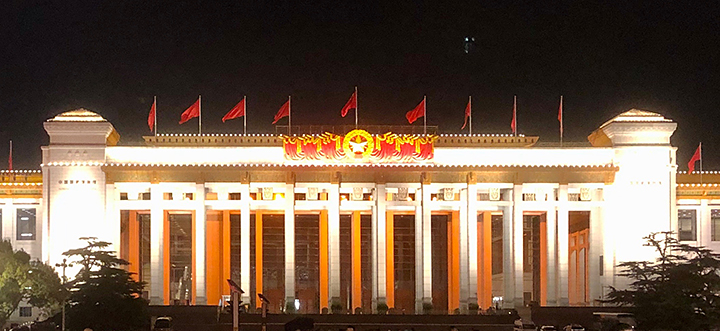
September 19, 2019: Reciprocal Trade and Investment
I’ve given some thought to how to reboot the relationship between America and China.
There are some basic issues, both real and concocted, that have driven these two natural allies into separate corners for the moment. But there are practical ways out and forward — with renewed opportunity for both countries.
We’re practicing the reboot through our joint venture company, Galaxy Trade and Technology. On the business level, we’re bringing Chinese magnesium more efficiently to world markets — but there’s much more. We hope others find these ideas useful. In the paper completed today, and finalized on October 1, 2019, we say:
“The Galaxy business model is different from most companies involving America commercial investment in China. Galaxy is not exclusively oriented either to imports or to exports. It is both, and more…
The company deliberately seeks to solve some of the imbalances in trade relationships that have led to recent issues between the US and China.
That means, in practical terms, that Galaxy practices fully balanced commercial relationships between US and Chinese ownership companies. Its international contracts ideally feature both an import and an export orientation, simultaneously and interdependently, framed by careful control of intellectual property.”
Here’s more; you can download the paper here in English: Reciprocal Trade and Investment
And you can download in Chinese here: 互惠贸易投资
September 17, 2018 Unintended Consequences
“In 2017, the country imported $260 billion worth of chips and $162 billion worth of crude oil. More than $200 billion of the chip purchases were US-made chips, according to Bloomberg data.
Even more were US-designed chips, for which US companies received royalties.
You might think this would be touted as a huge success for US exporters. But, the current sanctions and threats of sanctions against Huawei, ZTE and others have permanently soured the market for US chips and other technologies.”
It was obvious that this would happen, when the new US tariffs against Chinese high tech goods were announced. More at:
September 16, 2019 Jack Ma
This video is a quick glimpse of a radically different China from the one currently portrayed in Western media — young, optimistic, an ironic sense of humor, heart-centered, un-self conscious.
*
*
At Jack Ma’s retirement party (age 55) over the weekend, one of the richest men in the world stepped down from day-to-day management of Alibaba, the firm he founded. The rock concert was broadcast throughout China on both private and state-run media.
He was rejected by 10 companies for a job, and by 30 companies for investment in his ecommerce system — as a school teacher just 15 years ago. He will spend his time now investing in making the world a better place.
If those in the West who are forming harsh paranoid judgments of China right now could see this video, understand the spirit behind it — and meet some of the 60,000 people who cheered as Jack Ma sang this song — their reading of the Real China might be different.
If.
Yes, I agree — there is much more to a huge, complex nation like China than one video — and much behind the scenes. That’s my point; please have an open mind.
This is part of the China I see, when I go to live and work there.
September 8, 2019: The Good Old Daze
There was a time when Republicans listened to people named Bush and Brzezinski; we may not have agreed with everything they said, but their sober common-sense, heard afresh now, hearks back to an age that seems now dead…
Here, at an economic development forum in Beijing, the sons of Bush and Brezezinski hold forth. Note the image of Premier Zhou Enlai in the history section, as a key exemplar of Chinese diplomacy. His influence continues to grow.
click to download:
Development-Forum-China
August 15, 2019: A Legend
They just hosted an intense set of presentations on future economies at the main civic theater there. See video; you don’t have to speak Chinese to sense the energy —
The future of China, and perhaps the future of the world, is in the hands of such people.
We would like to connect TED Shanghai with the other TEDs we know — NYC, Honolulu, SFO, Washington, San Diego. That could be explosive in a beneficial way.
August 12, 2019: Common Enemies
Our friend and colleague, Arthur Lipper, attended the GPS 21st Century China Forum at University of California, San Diego this week — and emerged with the following thoughts:
“…to quote Nelson Mandela, “If you want to make peace with your enemy, you have to work with your enemy. Then he becomes your partner.”
“Fear in animals is responsible for species survival. Fear is the most natural of all emotions.”
Download more here: Common-Enemies
August 6, 2019: Whom do you Believe?
On the one hand —
https://www.bloomberg.com/news/articles/2019-08-05/china-retaliation-is-11-on-scale-of-1-to-10-wall-street-warns
On the other —
http://www.chinadaily.com.cn/a/201908/06/WS5d487f57a310cf3e3556401e.html
I’m inclined to accept China’s more measured position. China did not devalue the yuan; the central bank does not directly control the exchange rate any more. They simply allowed the yuan seek its own level this week, according to market forces.
They are playing a cool hand here, and will ultimately prevail in the standoff with the current Administration in Washington, which has no clear policy goals or consistent leadership.
July 19, 2019 – A Balanced View from Brookings
“For both Washington and Beijing, the patient rebuilding of a rules-based order, not the assertion of unilateral advantage by either, remains the only credible path forward. Rather than mirror-image Chinese xenophobic or paranoid behavior, the United States should insist on reciprocity in the relationship to promote openness, move aggressively to open China’s markets, welcome Chinese visitors and researchers, and defend our allies. The United States also needs to fix its own broken domestic politics and mitigate the downsides of globalization at home to diminish the gratuitous scapegoating of China. Without such efforts, the region and the world will inevitably move toward open-ended rivalry, or worse—from which no country, including the United States, can possibly benefit.”
Jonathan Pollack, a seasoned thinker with real experience in China, offers the above insight. Writing for the Brookings Institution with the arresting title, “Looking Before We Leap,” Pollack cautions against the retrograde thinking, which has become fashionable since 2017, that America and China should decouple our affairs, go it alone, and America should seek to curtail China’s continued growth.
The more mature approach, which we believe will re-emerge and will prevail in the end, is for America and China to link up as partners for economic and social development, as joint solvers of the truly vast global challenges we face.
A full consideration of Pollack’s thinking is worth a few minutes: US-China-Disengagement-Risks-Brookings-Pollack
July 16, 2019 – A View from China’s Young Leadership
July 15, 2019: A Family Milestone
BEIJING: A celebration of the life of Zhou Huazhang, nephew of the former Premier of China, Zhou Enlai, took place yesterday in Beijing. Zhou Huazhang led a simple life, yet his accomplishments were significant. He helped China to emerge as a strong, united nation through a dedicated professional career. He also had a long history of positive connection with his family in the United States. Mr. Zhou passed away peacefully on July 2, 2019, at his home in Beijing. The celebration of his life, a statement of renewal for all his friends, family and colleagues, was held at the Grand Hyatt Hotel, Beijing beginning at 11:11 am.
Further press release follows:
And so it goes.
July 9, 2019 — Digital Currencies
Another area where — big surprise — China is well ahead of the U.S., which at the government level has yet to begin considering the policy issues around digital currencies:
June 24, 2019: The Parthenon. And China at the British Museum. In one day
On a recent business trip to London, some time out to revisit the Elgin Marbles — the sculptures and friezes from the Parthenon in Athens.
Timeless, elegant, tragic. Moving iconic images from the headwaters of Western Civilization.
Just five hundred feet away, a recent major collection added to the British Museum: from the even deeper history of China. Art and artifact from the headwaters of Eastern Civilization.
Amazing to spend time in both worlds, on the same day.
June 17-18, 2019: The Financial Universe Moves On
As the freeze in US-China economic devleopment grinds into its sixth week, the world moves on. China and Europe forge a new financial and trade system that does not need American blessing or participation.
Two stories illustrate: “China’s leading commercial bank ICBC announced on Monday the appointment of BNP Paribas and HSBC as joint green coordinators and mandated lead arrangers for an inaugural green loan for ICBC’s London branch.”
More: https://enapp.chinadaily.com.cn/a/201906/18/AP5d08aaa7a3107b899aca6838.html
HSBC says: “The funding demonstrates HSBC’s commitment and dedication to the green loan market, which we are determined to support and develop. This is part of our commitment to provide $100 billion in sustainable financing and investment by 2025.”
And yesterday, the long-awaited live integration of the London Stock Exchange and the Shanghai Stock Exchange was completed, and is now fully operational. Investors anywhere in the world can freely trade a wide range of Chinese securities, directly; the converse is also true — Chinese investors can buy and sell international securities any time, day or night.
More: https://enapp.chinadaily.com.cn/a/201906/17/AP5d0744b1a3107b899aca65ff.html
“The connect, a two-way depositary receipt mechanism that brings together two of the world’s largest capital markets, brings together one of the world’s largest domestic capital markets – the Shanghai Stock Exchange – with the world’s leading international market, the London Stock Exchange.”
Very often, social and political change is signaled first in the world of finance, which is always alert to opportunities for growth.
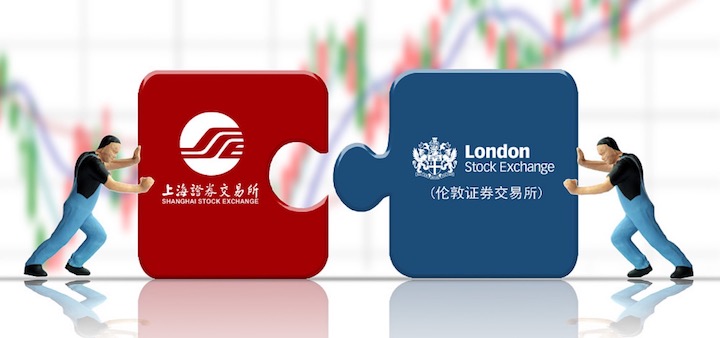
The day will come when U.S. financial markets, still the most potent in the world, resume participation in strategic planning fro global growth. That will signal big opportunities for those patient enough to wait, watch and learn.
June 11, 2019:
A good friend and longtime business associate, former executive at the Ministry of Commerce in Beijing, writes:
“China-US friendship is a bridge between the Chinese and American people, to share culture and business opportunities, and it’s the best way to create unity among all the people of the world.
I hope that through non-governmental diplomacy, China and the United States can reduce the friction between political, trade and commercial interests, and promote a deeper, pragmatic link between the culture of China and American culture.”
中美友谊是搭建中美两国人民文化与商务经济共享的最好桥梁纽带,也是缔造世界人民大团结最好的契机。
希望通过民间外交更好的减少中美两国政治与商务经济合作及贸易之间的摩擦,促进中美文化更深厚的务实衔接。
June 9, 2019: Ping Pong Diplomacy
Representatives from the Zhou Enlai Peace Institute were invited to speak at the celebration of the anniversary of ping-pong diplomacy in Haimen, Jiangsu Province. The invitation came from old friends whom we first met Los Angeles — Yang Jiechi, and his associate Cai Chenghua — where we co-sponsored the “Building Peace” events.
Xiaofang Zhou and Michael North met many of the dignitaries present. Michael North gave an extended talk on the impact of ping-pong diplomacy in 1971, and its lessons for today and the future, addressing his remarks to the hundreds of high school students present.
A complete account: with photos and video: http://www.zhouenlaipeaceinstitute.org/stories/ping-pong-diplomacy/
June 6, 2019: Balance
Bring your own interpretation to this video:
June 5, 2019: The Real White Paper from China
There has been a great deal of analysis, commentary, reaction and speculation about the White Paper published by two days ago by the Chinese Government, intended to clarify issues around the current trade talks with the United States.
Much of it slanted, pre-judged, partial and out-of context, designed chiefly to support the conclusions of the writers, not necessarily to inform.
I much prefer to read the original document, and form my own judgments.
Attached — the original document from the State Council website, in .doc format, titled China’s Position on the China-US Economic and Trade Consultations
The download link, from which many other interesting documents are available, is:
http://english.gov.cn/archive/white_paper/2019/06/02/content_281476694892692.htm
Reading this document, one gets a clear, unfiltered idea of what the Chinese are actually saying. It’s worth noting that no similar document exists from the U.S. government.
For those wishing a truly precise version, concise as only Mandarin Chinese can be, the original-original text is here:
http://www.gov.cn/zhengce/2019-06/02/content_5396858.htm
June 1, 2019: More reasons the world needs China
Another reason the world needs China is that China the world’s most populous country, and fastest-growing major economy, has assumed leadership of large-scale, industrial implementation of environmental and clean energy initiatives. The U.S. has, for the time being, withdrawn from such efforts at the national level, though significant independent work continues at the state and local level. Other countries are making important efforts too, but none on the scale and pace of China.
See this story, current report on progress made in cleaning up China’s toxic environment. China still has a long way to go, and it will take some time. But the effort is under way, and a study of how China is doing it is worthwhile.
https://enapp.chinadaily.com.cn/a/201906/01/AP5cf15125a3104dbcdfaaaac2.html
Those of us who spend time in China’s big cities — Beijing, Shanghai, Tianjin, Xi’an have all been in our path in the past few months — note, anecdotally, that the skies seem more blue, the air less thick, on many days.
May 24, 2019: The Roar of the Lion
You may enjoy this video, from our meetings in Lexington Kentucky last week —
“The Lion in this moment is the people of the United States, the people of China. But who among us will deliver the roar?
Now is the time for the roar to be delivered. the roar of Sino-US relations, of building bonds, of being partners, of being friends, of coming together, weaving a fabric together… Now is the time. We cannot grow weary, we cannot give up. We must rise up, as ambassadors, for what is the right thiing to do… To do the right thing for the world …
When there is strength and stabiity and peace in China…when there is strength and stabiity and peace in America…both the east and the west will be stronger, the world will be stronger, the world will be safer, and there will be more opportunity for all of us.
I’m not afraid of hard work. I ask each of you to roll up your sleeves, put on your overalls, deliver the roar of history. Because history is knocking, and now is the time.”
Governor Bevin is one of the leading supporters of President Trump, in a state that voted heavily for Trump in 2016.
May 23, 2019 — Governors Conference in the Washington Post
From the front page of the Washington Post today — all about the Kentucky conference we are attending, China and the trade war —
All that Kentucky Bourbon magic.
May 21, 2019 — Press Release: New US-China Magnesium Joint Venture Announced at National Governors’ Conference
A trade and economic development conference, sponsored by the National Governors Association in Lexington Kentucky May 22-24, will announce Galaxy Trade and Technology, a new joint venture between companies in the United States and China. The joint venture combines the best of America and China, and demonstrates new principles of reciprocal management. It links a group of magnesium mines in China, together with global trade, logistics and finance in America.
Details:
https://www.einpresswire.com/strategic-us-china-joint-venture
May 10, 2019 — The First Reaction by China to the Tariff Hikes
http://www.chinadaily.com.cn/a/201905/10/WS5cd4fa89a3104842260bafa3.html
A quick read of this first response from China to the big tariff surprise from Washington — which had not even been intimated until four days before — and was executed in a tweetful moment.
“The Ministry of Commerce expressed ‘deep regrets’ on Friday at the United States’ decision to hike tariffs and said China will have to take necessary countermeasures….China hopes that the US side can work with China to jointly build a China-US relationship based on coordination, cooperation and stability.”
The impulsive move took virtually every other U.S. government official by surprise.
April 25, 2019 — Views of the Belt and Road
The ever-insightful Paul Haenle offers off-script views of the Belt-and Road — from the perspective of some of the countries most affected, most critical, and competing.
Russia, India, Europe and the United States — all get their turn in this analysis, from writers in those fields. This is one of a series of valuable pieces coming from the Carnegie-Tsinghua Center in Beijing.
Samples:
“All countries, including the United States, should have a strong interest in supporting better infrastructure and connectivity. In this way, they should welcome China’s contribution to global infrastructure development. However, China also needs to address the BRI’s shortcomings, in areas such as transparency and sustainability.”
“India has eyed the BRI with suspicion since its announcement. New Delhi turned down Beijing’s invitation to the inaugural Belt and Road Forum in May 2017. Instead, it has made pointed statements about transparency and debt burdens.”
“Moscow’s current relatively benign attitude to the BRI took some time to emerge. Its immediate reaction was largely negative, driven by fears that China wanted to expand into Russia and Central Asia, territory that Moscow considers important in security and economic terms.”
More from Paul Haenle: https://carnegietsinghua.org/experts/490
Carnegie Tsinghua Center for Global Policy
English: https://carnegietsinghua.org/?lang=en
Chinese: https://carnegietsinghua.org/?lang=zh
April 28, 2019 — Opening Address, Belt and Road Forum
Here is the opening address by the President of China to the Belt and Road Forum in Beijing.
 The original Chinese is here. We have also translated it into English, which provides a useful reference.
The original Chinese is here. We have also translated it into English, which provides a useful reference.
I like to go back to the original source for important ideas, rather than reading press summaries or the commentary of analysts. There is always some nuance missed by the mainstream or diplomatic press.
Which is certainly the case here. Many sophisticated ideas, opening up doors of opportunity for business and civil society, answering key questions.
April 24, 2019 – – American Participation in the Belt and Road
https://stage.fortune.com/2019/04/23/us-china-belt-and-road-initiative/
“The Belt and Road Initiative means countless opportunities for US businesses, and China invites more of corporate America to participate in the projects to benefit themselves and the world at large…The situation has implications not only in terms of missed opportunities for growth in the US, but for the cause of global development, which needs the ingenuity and the industry of the US.”
“He’d been at an impact investment event at which I’d spoken. An audience member had asked the panel how they dealt with climate skeptics: did they still promote the climate protection philosophy behind their portfolios?
“Predictably, the others equivocated.
Which pissed me off. “This,” I growled, “Is why ‘impact investing’ is getting a bad name. It’s trying to be everything to anyone who might let you manage their money.”
April 12, 2019 — Belt and Road, Reconsidered
I wish everyone could go to events like this, at the U.S. Institute for Peace —
https://www.usip.org/events/chinas-belt-and-road-initiative-year-six
Though I did notice that there is no representative from China in these discussions. Their perspective would surely be relevant to a full understanding of the issues. <?>
United States Institute for Peace is an interesting institution. Funded by Congress, with a bipartisan blue-ribbon Board. And some blind spots. http://www.usip.org
One of its original sponsors and biggest advocate was Senator Spark Matsunaga of Hawaii, whose Matsunaga Institute here in Honolulu continues its solid work to establish the case for peace.
April 10, 2019 — EU-China Relations
Balanced views on EU relations from China’s official national newspaper —
https://enapp.chinadaily.com.cn/a/201904/08/AP5caa9203a3104dbcdfaa58f1.html
April 11, 2019 — China Copyright Law Matures
You may have heard that China has loose intellectual property rules, and does not respect international copyrights.
This was true — up to about 5 years ago. That’s when China initiated a crackdown on copyright enforcement to come up to international standards. The signs of progress along these lines are everywhere.
This story is quite cute, about the lengths to which China went recently, to publicly dress down a copyright infringer and fix an issue.
https://enapp.chinadaily.com.cn/a/201904/13/AP5cb117cda3104dbcdfaa61b4.html
March 9, 2019 — “Siding with Rich China over Fickle U.S.”
“He pointed to the current state of unpredictability of the American superpower as a negative factor when asked about the impact of Sino-American tensions on other, smaller nations in the region.”
A future American administration may be able to repair the damage done to international relations since January, 2017 — but it will take patience, concerted action and long-term commitment.
Full story at https://www.scmp.com/week-asia/politics/article/2189074/id-side-rich-china-over-fickle-us-malaysias-mahathir</

